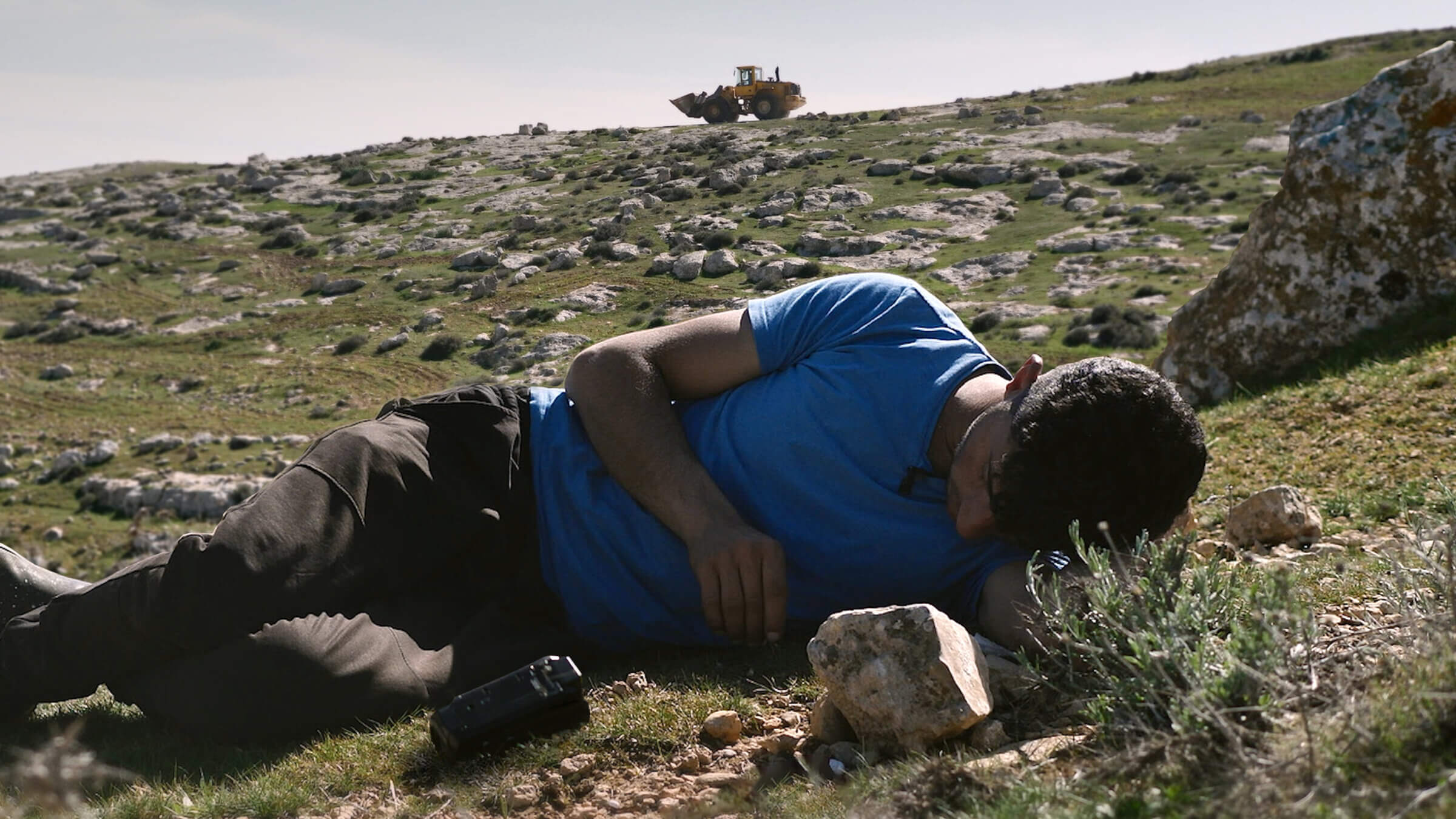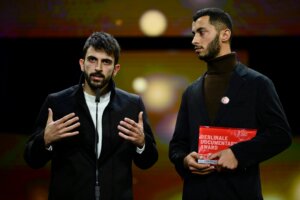In a searing new documentary, unimaginable pain and suffering in the West Bank
Winner of the Best Documentary award in Berlin, ‘No Other Land’ arrives with images of war and pleas of peace

A scene from ‘No Other Land,’ which had its US premiere at the New York Film Festival. Courtesy of New York Film Festival
It all started in 2019 when Israeli journalists Yuval Abraham and Rachel Szor traveled to Masafer Yatta, a region in the West Bank, to report on Israeli attempts to forcibly evict residents in order to turn the region into a military training facility. There, they met Basel Adra and Hamdan Ballal, both of whom had been filming the demolition of villages in Masafer Yatta for years. After developing a friendship, the group of four decided to make a film that would spread awareness of the evictions. The result is No Other Land, a documentary that chronicles the destruction of Masafer Yatta.
Primarily through close-ups and POV footage, the film follows Adra as he documents the slow destruction of his home. In just an hour and a half, the film captures an unimaginable amount of pain and suffering — homes get torn down in front of families while children cry; unarmed Palestinians get shot by soldiers and settlers at point-blank range; a water well is filled with cement because, according to the soldiers, the Palestinians do not have the proper permit for it. In one scene, shirtless settlers wearing head wraps to hide their faces appear and start throwing rocks at Palestinians. An Israeli soldier simply stands with the settlers and watches.
More a series of intense vignettes of violence and grief than a story with a typical build, climax, and resolution, No Other Land is at its strongest when Adra’s narration and storytelling accompanies the footage. The juxtaposition of older footage that captures the joy that had once existed in Masafer Yatta with images of contemporary terror and devastation is especially compelling.
The film, it must be said, does not end on a hopeful note. In the last bit of footage we see, armed settlers arrive in Masafer Yatta on Oct. 13, 2023 and shoot Adra’s cousin.
‘They beat us up and they smash cameras’
Filming came with a number of risks and challenges, Adra told me when I spoke to him and Abraham, who were in New York for the film’s US premiere at the New York Film Festival. Adra explained that several times, the IDF raided his home to confiscate cameras, laptops, and even the car that he and his fellow activists were using. Sometimes, Adra said, the violence turned physical.

“They beat us up or hit us, and they smash cameras many times,” Adra said. “It happens from settlers and Israeli soldiers.”
Adra and Ballal said they were both blacklisted and banned from entering Israel, which meant that the only place that the team could edit and work together was in Masafer Yatta.
The filmmakers said they hope that one day they will be able to make the film equally accessible to Israelis and Palestinians, especially those already involved in anti-occupation work.
Since the film premiered in February at the Berlin Film Festival where it won the award for Best Documentary Film, the situation in the Middle East has only gotten more intense with thousands more Palestinians killed, and at least six Israeli hostages murdered. Abraham says people’s openness to the message he and his fellow filmmaker-activists have been spreading has changed as well.
“Often, things change after the devastation has already happened,” Abraham said. “We were, in February, calling already to stop the war and that was considered controversial at the time. Now, after 2% of Gaza’s population was killed, when most of the Israeli hostages were killed, when all of the population is uprooted, suddenly that has become more mainstream.”
‘We want our movie to be seen’
Here in New York, a group of local activists started the New York Counter Film Festival (NYCFF) calling for a boycott to protest the “Zionist funders” of the film festival and Lincoln Center where many of the films are being screened.
Adra and Abraham had not heard of NYCFF, but said they had dealt with a similar situation in Berlin, where some filmmakers and activists threatened a boycott if the festival showed allegiance with Israel. They, however, chose to attend the festival.
“We said, well, for sure we want a ceasefire, and we said it very loud. But also we want our movie to be seen,” Adra told me. “People in Germany, in the US, those audiences that go to this theater must see what’s really happening.”
So, once audiences have seen the film, what do the filmmakers think they should do next?
“This is a fundamental question in the film,” Abraham said. “What can you do? What can we do as activists on the ground? What can Palestinians do? What can Israelis do? What can people in the United States do? And we honestly don’t have all the answers. I think one thing that is clear to me is that the United States needs to change its foreign policy with regards to Israel and Palestine.”
Abraham went on to say that he believes that Jewish Americans have a significant role to play in pressuring the United States to change its foreign policy, but may not recognize the reality of the situation.
“Many Jewish Americans have this romantic image that by maintaining this US foreign policy that has prevented political change, they are somehow helping Israelis, they are somehow helping Jewish people. That is based, in my mind, on a wrong reading of reality on the ground,” Abraham said.
“We’re seeing now an Israeli government that has shown, in my mind, complete disregard for Palestinian civilian life,” Abraham said. “But also a complete disregard for its own citizens.”
Abraham asserted that while the killing of civilians is never justified, violence is the result of Israel’s restriction of Palestinian’s ability to take peaceful political action.
“There is literally no political horizon, they’re offering nothing except more war and more bombs and more civilians being killed,” Abraham said.“And yes, Jewish Americans should demand of this government that is acting often on behalf of caring for the Jewish people to say, ‘No, this is wrong, it cannot continue, and we demand from our own politicians to change their foreign policies so that this does not continue.’”
No Other Land will have a one-week run at Lincoln Center starting Nov. 1.
A message from our Publisher & CEO Rachel Fishman Feddersen

I hope you appreciated this article. Before you go, I’d like to ask you to please support the Forward’s award-winning, nonprofit journalism so that we can be prepared for whatever news 2025 brings.
At a time when other newsrooms are closing or cutting back, the Forward has removed its paywall and invested additional resources to report on the ground from Israel and around the U.S. on the impact of the war, rising antisemitism and polarized discourse.
Readers like you make it all possible. Support our work by becoming a Forward Member and connect with our journalism and your community.
— Rachel Fishman Feddersen, Publisher and CEO






















